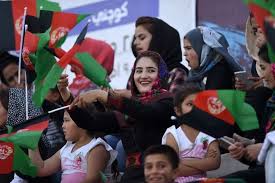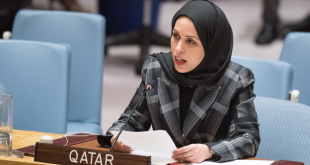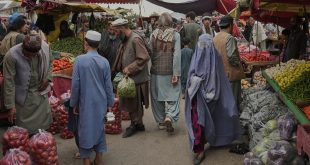“The fallacy of red line movement”
By Aisha Khurram
Afghanistan is now standing on the verge of a critical situation, as peace talks are gaining momentum by each round. After the first session of the 8th round of negotiations with Taliban the U.S Special Representative for Afghan Reconciliation Dr. Zalmay Khalilzad outlined a positive momentum in the peace process and expressed optimism regarding the progress made in negotiations with Taliban.
The ongoing peace process initiated by the United States of America along with Taliban’s willingness to negotiate and resolve the deadliest war in the history of Afghanistan through political means is a sign of hope for the war stricken and frustrated Afghan people.
Despite all the hopes for a peaceful Afghanistan, the Afghan people are now concerned about various issues on route to a political deal with Taliban, such as the consequential violence and gender discrimination that people have suffered during the Taliban regime.
The rumors regarding giving a share to the Taliban movement in Afghanistan’s political system sounds like a nightmare for those women who’ve suffered enormously during the Taliban regime. Although Taliban leaders based in Doha demonstrated their flexibility during peace talks regarding women’s rights and gender equality, the Afghan women are still concerned about their rights and freedom.
At the same time, women in Afghanistan have once again taken to social media to ensure that their rights and freedom are protected in the ongoing peace process, using the hashtag “My red line” a campaign led by Kabul based female journalists, civil society activists and feminists. Through this campaign the so called women advocates spoke of their concerns and fears about what sacrifices would be made to make peace with Taliban.
The red line movement focuses on certain points such as: gender equality, freedom of expression, right of education and work, and the protection of achievements made by Afghan women during the last 18 years.
While appreciating the movement and courage of these Afghan women for voicing their concerns and highlighting their role in the peace process, there are certain issues feminists and women’s rights advocates overlook while campaigning for the protection of their rights.
Let’s see the bigger picture in this scenario while defending women’s rights the redline movement first and foremost needs to consider those women who live in provinces, districts and rural areas that are under the control of Taliban, those women who suffer from violence at the hand of Taliban, late night bombards and airstrikes by the US and Afghan forces, those women who spend their days darkened with horror and nights with the fear of heavy bombardments. We shall never ignore the fact that Peace, tranquility and normalcy is their sole dream; they’re starving for a peaceful and normal life and they need this peace more than any of us do.
While applauding these activists for standing to defend their rights it is also fair to have the expectation and also the regret that such movements should have been witnessed throughout the over-a-decade long war the US has led where the fundamental rights of not only women but civilians at large have been violated. Massacres have been witnessed, where the US has bombed civilians for years; they’ve tortured and harassed civilians including women, yet no redliners stood for the women’s rights then.
While considering fundamental rights of a human being living a normal and peaceful life comes first while education, work opportunities and freedom of expression are its byproducts. Taliban hold control of more than half of Afghanistan’s territory therefore most of the Afghan women reside under the Taliban rule; most of them have never had access to education and privileges we have enjoyed over the past 18 years. Considering all these issues as a matter of fact a meaningful peace and a normal life will pave the ground for their betterment and facilitate their access to education and work opportunities.
I, hereby, would like to request all civil society activists and women’s rights advocates to consider the basic and fundamental rights of each and every Afghan woman residing in any corner of this country, otherwise the initiated campaigns and movements would only lead to the disruption of the ongoing peace process and nothing more.
 Afghanistan Times
Afghanistan Times




